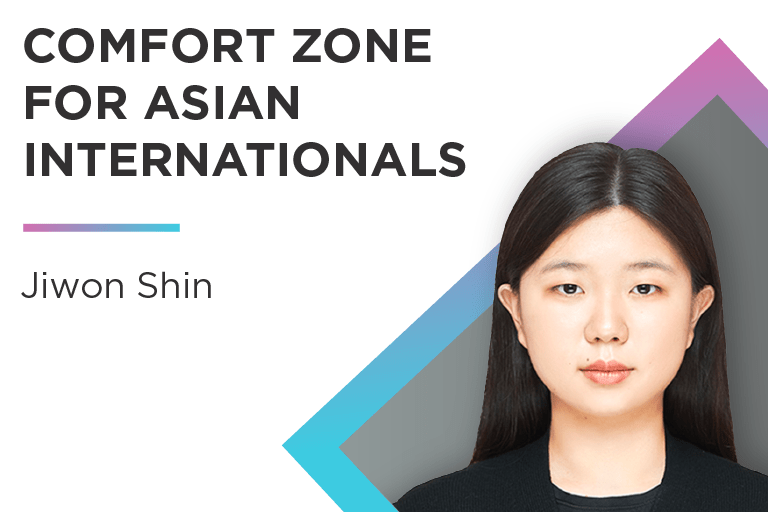Inspired by a project in Jeana-Dee Allen’s CAS 110 class, international student Jiwon Shin has created the new “Comfort Zone for Asian Internationals.” The Comfort Zone is a group that provides a community space for international students far from home to feel connected and safe on campus.
After February’s tragedy, Shin identified that Asian international students, already away from their homes, families, and typical social networks, could be feeling especially lonely, isolated, or unsafe during these uncertain times.
“During this tragic time, Asian international students had a lonely and difficult time because they could not be with their loved ones in their home country,” said Shin. “[I] imagine their parents worried about their children, but who can’t be with them. It was also sad that the perception of my beloved university had changed to a place of insecurity.”
“I asked myself, ‘How good would it be if there was a space where we could gather together at any time without feeling lonely?’ So, I decided to make my class assignment come true.”
However, taking the Comfort Zone from idea to reality wasn’t as easy as it seemed. Shin worked hard to see her idea through, despite personal setbacks and the uncertainties of planning something new for the first time. Shin says the Office for International Students was a vital resource while creating the Comfort Zone.
“The OISS team was with me (especially Haley, Rebekah, and Mohamed). They are constantly in touch with me, giving me ideas and assistance. I could always feel that they were with me,” said Shin. “As a result, through various simulations and opinions, I planned and implemented a place and program to make Asian internationals feel more comfortable.”
The first meeting of the Comfort Zone, which took place on March 16, has already had an effect for international students. Shin shares that “this space is filled with warmth from person to person,” and is a place where students “can share their experiences, knowledge, and thoughts with other Asian international students.”
“The Comfort Zone is a space that helps Asian international students have stability. We can comfortably meet here regularly, and the space has been a steady recovery program for international students,” said Shin.
For Shin, creating the Comfort Zone is just the beginning, and she is already planning new ways to make international students feel more connected and at home here at MSU.
“My future plan for Comfort Zone is to extend it beyond Asian international students and provide a comfortable space for other international students through non-formal programs,” Sin said. “In addition, I will work with exchange students so that they can serve as MSU ambassadors to schools in their home countries. I will consistently do my part as someone who can give a hug when someone reaches out to me.”
While creating the Comfort Zone was difficult, Shin is proud of the difference the group has made in the community, bringing people together and giving them a space to feel connected, supported, and seen.
“The Comfort Zone has had a positive impact on people and the community. The concepts of me, you, and we are important. This space helped us to solve our own troubles by showing that I, you, and we are all connected.”
Her instructor, Jeana-Dee Allen, also identified the power of the Comfort Zone and Jiwon’s work.
“Jiwon saw instability in international students and created a solution through interviews and using empathy to inform decision-making,” Allen said. “In collaboration with OISS, Jiwon is changing the experience of a community. It’s inspired, incredible work. It’s taking what’s learned in the classroom and applying it to what’s relevant to students right now.”
Office for International Students and Scholars
By Connor Beeman
